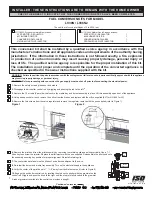
13
Chimney Flashing and cap
(See FIGURE BELOW) The vent kits include a trim-able flashing. Measure, trim and shape flashing to fit the
existing flue liner. This flashing prevents water and small animals from entering area between the chimney
liner and flue liner. Plan for 1” to 1-1/2” (25 mm to 38 mm) overlap on each side. Center the flashing and
mark it about 3" (75 mm) larger in each dimension than the existing chimney. Trim the notch with snips and
bend edges with hand seaming tool, metal break or pliers.
12. Attach a sheet metal strap loop to the flex end of the liner(s) and tie a rope to it. Two installers
should proceed to the roof and drop the rope (with weight on the end to make sure it goes all the way
down) and insert the 4” liner(s) past the flexible portion, into the existing chimney – SEE BELOW:
NOTE: The 3” liner shall be cut at about 5 feet length and only stubbed into the chimney past
the damper, from below.
13.
One installer should then return to the fireplace opening and pull the rope to guide the liner(s) into place
through the smoke shelf and the damper opening to a point 22" (560 mm) above the fireplace hearth.
The person below should wear leather gloves and Safety Glasses during this process to avoid being cut
and to safeguard eyes from flying debris.
CAUTION: WHEN USING FLEX ALUMINUM LINER, USE EXTREME CAUTION WHEN STRETCHING
LINER
AROUND OFFSETS SO AS NOT TO RUPTURE LINER.















































